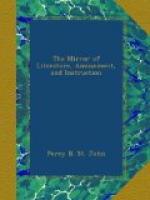THE FORGET-ME-NOT.
Eighty-three pieces in verse and prose are the modicum of entertainment in this delightful little work. Of course we cannot enumerate a quarter of their titles, but only mention a few of the most striking. Among the prose is “A Quarter of an Hour too soon,” by the author of “The Hour too many,” in the last Forget-Me-Not. Our favourite story is The Red Man, by the Modern Pythagorean of Blackwood, which we quote almost entire:—
“It was at the hour of nine, in an August evening, that a solitary horseman arrived at the Black Swan, a country inn, about nine miles from the town of Leicester. He was mounted on a large, fiery charger, as black as jet, and had behind him a portmanteau attached to the croup of his saddle. A black travelling cloak, which not only covered his own person, but the greater part of his steed, was thrown around him. On his head he wore a broad-brimmed hat, with an uncommonly low crown. His legs were cased in top-boots, to which were attached spurs of an extraordinary length; and in his hands he carried a whip, with a thong three yards long, and a handle which might have levelled Goliath himself. On arriving at the inn, he calmly dismounted, and called upon the ostler by name. ‘Frank!’ said he, ’take my horse to the stable; rub him down thoroughly; and, when he is well cooled, step in and let me know.’ And, taking hold of his portmanteau, he entered the kitchen, followed by the obsequious landlord, who had come out a minute before, on hearing of his arrival. There were several persons present, engaged in nearly the same occupation. At one side of the fire sat the village schoolmaster—a thin, pale, peak-nosed little man, with a powdered periwig, terminating behind in a long queue, and an expression of self-conceit strongly depicted upon his countenance. He was amusing himself with a pipe, from which he threw forth volumes of smoke with an air of great satisfaction. Opposite to him sat the parson of the parish—a fat, bald-headed personage, dressed in a rusty suit of black, and having his shoes adorned with immense silver buckles. Between these two characters sat the exciseman, with a pipe in one hand, and a tankard in the other. To complete the group, nothing is wanting but to mention the landlady, a plump, rosy dame of thirty-five, who was seated by the schoolmaster’s side, apparently listening to some sage remarks which that little gentleman was throwing out for her edification. But to return to the stranger. No sooner had he entered the kitchen, followed by the landlord, than the eyes of the company were directed upon him. His hat was so broad in the brim, his spurs were so long, his stature so great, and his face so totally hid by the collar of his immense black cloak, that he instantly attracted the attention of every person present. His voice, when he desired the master of the house to help him off with his mantle, was




